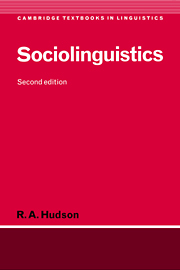7 - Theoretical summary
Published online by Cambridge University Press: 05 June 2012
Summary
Introduction
This final chapter is an attempt to tie together some of the general ideas that have emerged in the earlier chapters. The strength of sociolinguistics is its firm foundation in concrete facts – facts about language use in particular communities, figures for linguistic variables and so on. This concreteness is one of its main appeals, but also a serious weakness because we badly need a general framework of ideas to integrate the facts into a whole that makes some kind of intellectual sense. We have mentioned a number of subtheories about particular areas, all of which are well supported by evidence:
the ‘family-tree’ and ‘wave’ theories of change,
variety-based and item-based models of language,
the ‘classical’ and ‘prototype’ theories of thought,
the Sapir–Whorf hypothesis about language and thought,
the ‘face’ theory of interaction,
the ‘accommodation’, ‘network’ and ‘acts of identity’ theories of linguistic choices.
What we have not yet tried to do is to show how they all fit together. This is our rather ambitious aim for the next section.
Nor have we asked what all these facts imply for a general theory of language structure. Over the past decades linguists have been busy inventing theories about how language is organised internally – theories of syntax, of semantics, of phonology and of morphology. Most theories assume a clear distinction between ‘language’, consisting only of phonology, morphology, syntax and semantics, and everything else, which leaves most of the data of sociolinguistics outside language.
- Type
- Chapter
- Information
- Sociolinguistics , pp. 228 - 257Publisher: Cambridge University PressPrint publication year: 1996



